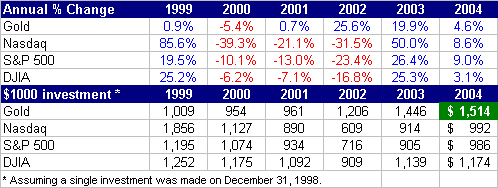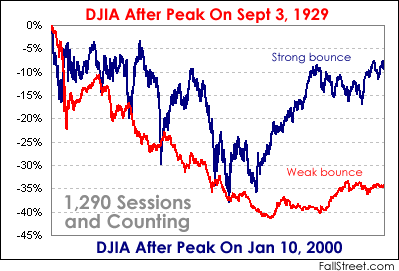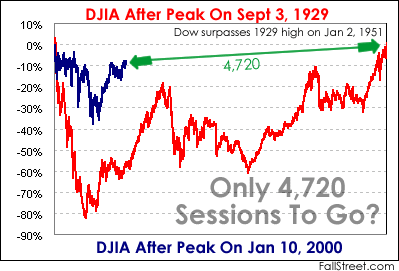March 4, 2005
Baum Should Mention Buffett Or Get Lost
By Brady Willett
Bears have the common courtesy to attack bulls by name (i.e. Kudlow, Cramer, and Cohen). Baum never mentions any names as she tries to take all bears prisoner.
In 1999 the Nasdaq set a new U.S. stock market growth record, and both S&P 500 and DJIA will rally by 20%. With this knowledge in hand before you embark upon a 6-year trip to Mars on December 31, 1998 what is one of the best investment decisions you could make? Gold!
 |
With the above statistics in mind – or that gold’s stellar performance over the last 3-years has beaten the performance of U.S. stocks over the last 6-years – you would think that gold investors would be on the cover of business magazines, that CNBC would be running a daily ‘Gold bugs’ show, and that the media would praising investors that have profited from owning gold. Instead the exact opposite is happening – no Blodget or Cohen type face is on CNBC telling the public to buy gold, and the press is actually poking fun at those that dare own the metal:
“Bearishness is a way of life for some folks, an end in itself. Many economists and analysts, not to mention an odd mix of physicians and college professors who write to me (when they're not buying up gold), maintain an Armageddon forecast, month after month, year after year. All that changes is the reason for the looming disaster, once the previous excuse fails to pan out.” Caroline Baum
Yes, thankfully Armageddon has not arrived, and some bears have been known to readjust their focus from time to time. But for Ms. Baum to deride one of the most successful investment choices in recent years – gold! – is nonsensical.
Other parts of Baum’s article – a piece that basically says bears should never bet against economic growth because the last two decades say so - are worth some discussion as well, including the feel good statements below.
“The first lesson is that an economy's natural tendency is to grow. Really it is. Unless you throw some nasty stuff at it -- higher taxes, excessive regulation, unnecessarily high real rates, a curtailment of individual freedoms -- people want to produce. They produce to profit, to have the means to buy whatever it is they want.
Underestimating the adaptability and flexibility of the U.S. economy hasn't been a good bet over the last two decades. Recessions have become rare, inconvenient intermezzos, painful for those who lose their job or their business but of little lasting effect on the overall economy.”
Of course Baum is right about the magical U.S. economy over the last two decades. However, what she neglects to mention is that most bears only started flying their colors in the late 1990s, and they have done extremely well since (at least those bears that don’t short stocks).
As for the other problem with Baum’s article, there is a running contradiction.
“No two business cycles are exactly the same.”
In light of how long the last expansion was and how short the last recession was isn’t this what the bears are saying right now?
Suffice to say, you could write a book about all of the bullish events have taken place over the last 20-years – some of which can not possibly occur again in the coming 20-years*. Knowing this, Baum still elects to use recent history as her guide, forgetting that history also contains a lost decade (the 1970s), 3 severe U.S. economic depressions, and countless recessions that have been more painful than the last two.
Baum’s Cheap Shot at Bears
Baum looks at the macro economic picture and yells ‘Bearishness is a way of life for some folks’, but what she mysteriously neglects to ever talk about is the world’s foremost bear: Warren Buffett. To be sure, Buffett is invested against the dollar, holding a record amount of cash, and has consistently talked about the lack of opportunity in the marketplace and/or the challenges the U.S. economy faces. And yet Baum never mentions his name.
Why does Baum not mention Buffett during one of her anti-bear commentaries?
Because she knows if she mentions the B word the investment world will be reading, and she had better have a damn good reason for attacking the second richest man in the world. I’m sorry, but Jean-Baptiste Say’s only popular quote, breaking news that the Fed has a printing press and that some bears are doom sayers doesn’t cut it. Baum is afraid of going after the big fish because she knows she doesn’t have the right stuff.
Conclusion
Not every market ‘bear’ has spent the last couple of years digging a shelter and stocking it with ammo. Rather, some bears – those that are light on stocks and own some gold/silver – are simply waiting for more things to go on sale (as they will from time to time). When you buy toilet paper on sale and refrain from buying salmon at regular price you are bullish toilet paper and bearish salmon. But wait -- all of a sudden Baum lunges into the picture saying that migration trends are not defying the experts and that you would have to be a fool to continue to be bearish on salmon! What Baum doesn’t realize is that most bears – Buffett included – know that there are more than 1-fish in the sea.
If the U.S. stock market continues to rally and/or the dollar rallies strongly, Baum may try to play the B card (she seems to be in training for it). Until then all of the Baum’s in the world can not change history: notwithstanding the current 2-year break the markets have done pretty lousy since the bear began in 2000. In fact, and as the above statistics show, even if you include 1999 in your math stocks have still done pretty lousy. 6-years is starting to border on the ‘long-term’.
In short, it will take a continued economic miracle for the major U.S. markets to hit their former highs anytime soon. Just to keep the last few years into perspective: if the markets are following the 1929 trend we are not even a 1/4 of the way back to a Dow record.
 |
 |
* 1) Unless a repeat of Japan is in store U.S. interest rates are not going to steadily decline over the next 20-years like they did over the last 20.
2) The home refinance market – which barely existed only 10-years ago and has been a driver consumer spending during the current recovery – can not continue to grow as rapidly over the next 10-years as it has in the last 10
3) The pool of new investors entering the markets can not (at least domestically) grow as rapidly as it has since the late 1980s going forward.